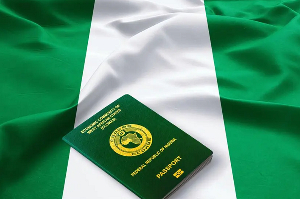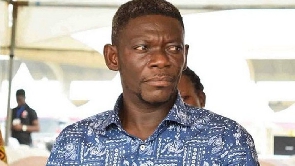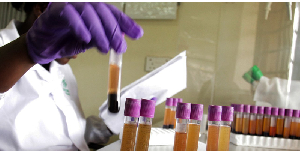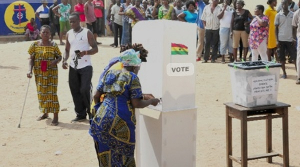- Home - News
- TWI News | TV
- Polls
- Year In Review
- News Archive
- Crime & Punishment
- Politics
- Regional
- Editorial
- Health
- Ghanaians Abroad
- Tabloid
- Africa
- Religion
- Election 2020
- Coronavirus
- News Videos | TV
- Photo Archives
- News Headlines
- Press Release
General News of Tuesday, 23 May 2000
Source: The Dispatch (Accra)
US Govt's View Of The Narcotic Situation In Ghana (1999)
Accra - Summary: Ghana takes an active stance against drug abuse and illicit trafficking of narcotic drugs and psychotropic substances. Ghana has active enforcement, treatment and rehabilitation programmes, and is a party to the 1988 UN Drug Convention.
II. Status of Country
Ghana is increasingly a transit point for illegal drugs, particularly cocaine and heroin from South America, Southeast and Southwest Asia. Most are headed for Europe, but some go to South Africa and a small amount to North America. Trafficking occurs at the Kotoka International Airport as well as the ports of Tema and Sekondi. Overland trafficking occurs at the land borders with Togo (Aflao) and Cote d'Ivoire (Elubo). As Nigeria improves its interdiction efforts, Nigerian traffickers are strengthening their presence in Ghana. The trafficking problem has fueled an increase in domestic consumption. Cannabis use is a problem in Ghana, although the extent of local cultivation is uncertain because of its clandestine nature. Individuals cultivate it in plots averaging about half an acre in size or by inter-cropping it in vegetable and staple food fields. Money laundering occurs, but this is not a major problem. Precursor chemicals are also not a major problem.
III. Country Actions Against Drugs in 1999
Policy Initiatives. The Narcotics Control Board (NCB) coordinates the efforts and cooperates with all organizations involved in counternarcotics activities. The NCB's 1999 activities encompassed numerous areas of counternarcotics, including enforcement and control, education, prevention, treatment, rehabilitation, and social re- integration.
In 1999 the NCB completed its counternarcotics master plan, renamed "The National Plan of Action 1999-2003." Financial and technical support was provided by the European Commission through its African Anti-Drug Programme (AADP) for West Africa. The policy initiatives of the Board are:
to motivate all organizations, both governmental and non- governmental, to assist in the suppression of illicit drug supplies being transported into the country, the reduction of drug demand and the fight against drug abuse and illicit trafficking;
to coordinate the efforts of all "stake-holding" organizations towards a common goal; and
to cooperate with the international community in the fight against the global drug scourge.
In 1999 the NCB submitted proposals to the government to amend the 1990 narcotics law. The following proposals were still under review in 1999:
A) amending penalties for drug offenses from a minimum of 10 years imprisonment to imprisonment of a term of not less than five years and, in addition, a fine of not less than ?20 million or a further term of not less than five years.
B) raising the fine for certain narcotics-related violations from ?20,000 in section 7 (2) to ?1 million because of depreciation of the Cedi.
C) amending section 4 of PNDC law 236 to vest in the Board any property forfeited under the law for the Board to manage and administer instead of the present situation where such fees, fines and other monies paid as fines go to the government's general fund.
D) defining the concept of possession/control to include the person who employed a carrier "mule", agent, or servant.
Law Enforcement Efforts. The police Criminal Investigative Division's (CID) narcotics unit based at CID headquarters in Accra undertakes interdiction exercises, raids, arrests, seizures, and prosecutions alone or in joint operations with officials of the NCB. NCB narcotics squads are locate at known drug-prone areas - Kumasi (Ashanti Region), Koforidua (Eastern Region) Ho (Volta Region) and Tema (Greater Accra Region)- which conduct similar operations. The Customs Excise and Preventive Service (CEPS) headquarters also has a counter narcotics unit, as well as anti-drug squads at some of Ghana's borders (at Aflao, on the border with Togo, and at Elubo, on the border with Cote d'Ivoire) and at Kotoka International Airport in Accra.
Statistics show a decrease in arrests, but more seizures in cocaine- related offenses. The slight decrease in arrest is perhaps due to the deterrent effect of increased law enforcement vigilance at the borders. One of the arrests took place in Papua, New Guinea and involved a single trafficker trying to smuggle a large amount of cocaine (7 kg.) A gram of cocaine, depending on its purity, sells at ?60,000. Heavily diluted cocaine sells at ?40,000 per gram.
Figures show a decrease in heroin-related arrests and seizures, again, perhaps due to the deterrent effect of increased law enforcement vigilance at the borders. A gram of heroin, depending on its purity, sells at ?40,000 - ?45,000. Heavily diluted heroin sells at ?25,000 - ?30,000 per gram.
There was an increase in cannabis-related arrests and seizures in 1999 but a significant decrease in quantities seized. The increased arrests may be due to greater vigilance. The NCB attributes the decrease in quantity seized to the deterrent effect of improved enforcement and drug prevention education which reduces demand for cannabis. Traffickers may also be carrying smaller quantities.
Drug dealers, using matchsticks as measures, retail cocaine or heroin at prices between ?1000 and ?2000, depending on purity. The matchstick is dipped in the cocaine or heroin powder and what collects on the head of the match is sold. A drug addict might need eight to twelve of these matchsticks per day.
The police narcotics unit has worked closely with the Accra INS sub- office. INS Accra continually receives information from sources in Ghana and the US who have identified drug activities between the two countries. INS shares this information with the Ghanaian police, who corroborate the information and ultimately work the case. This free exchange of information has resulted in the arrest of several drug dealers who have ultimately been convicted in Ghanaian courts.
In addition, several DHL packages containing narcotics, which were destined for Ghana, have been intercepted in the US due to cooperation between Ghanaian officials and the DEA. DHL Ghana has also cooperated with NCB to intercept narcotics packages destined for London.
Corruption. In 1999, there were no narcotics-related public corruption cases reported. There were two such cases from 1998, involving the Bureau Of National Investigations (BNI) and the Customs Service; these are still under investigation.
Agreements and Treaties. US-Ghana extradition relations are governed by the 1931 U.S.-UK Extradition Treaty, to which Ghana acceded. Ghana has extradited three narcotics offenders to the US under this treaty (one in 1992 and two in 1994). Additionally, Ghana is a party to the Economic Community of West African States (ECOWAS) Protocol Agreement, which includes an extradition provision. Ghana is also a party to the 1988 UN Drug Convention, the 1971 UN Convention on Psychotropic Substances, and the 1961 UN Single Convention and its 1972 Protocol.
Cultivation and Production. A combined team of the NCB's rapid deployment unit and the police narcotics unit continued to investigate the production and distribution of narcotics and to destroy cultivated cannabis farms and plants in 1999.
Marijuana or cannabis (also known as "wee" or Indian hemp) grows in Ghana, so it is easily available and widely abused. The cannabis comes from the rural areas, where it is cultivated illicitly, to the urban areas, where there is a ready market for it. Some cannabis is trafficked to neighbouring and European countries. A kilo sells between ?6000 and ?7000. A wrap or joint sells at ?3000.
Drug Flow/Transit. Cocaine and heroin are the main drugs that transit Ghana. According to DEA, there has been a notable increase in the number of intercepted packages of narcotics destined for Accra. Narcotics entering Ghana are sometimes repackaged for shipment to the United States and Europe through various concealment methods, such as: hidden in false compartments in briefcases, bags, cartons; deposited into unaccompanied baggage; hidden in exported foodstuffs (or placed in condoms or cellophane material, which is then swallowed by individuals. There is no evidence that drugs transiting Ghana have a significant effect on the U.S.
Money Laundering. Proceeds from illegal trade in diamonds, gold and narcotics are suspected to be laundered through the non-bank financial systems, such as the foreign exchange bureaux. Additionally, there are allegations that some funds are laundered through donations to religious institutions.
Seizures. Approximately $880,000 in assets of a drug baron wanted in the UK were forfeited to the state. The NCB received 20 percent of the forfeited assets. There are three cases pending. One case was in forfeiture proceedings at the end of 1999, with assets of $ 1.19 million. In the other two cases, seizure notices were filed against the assets of an individual jailed in the US for drug trafficking in 1996 and a fugitive drug dealer resident in Accra.
Precursor Chemical Control. The Food and Drugs Board (FDB)and the Ghana Environmental Protection Agency (EPA) control precursor chemicals by issuing licenses for chemicals and monitoring their distribution and use. The NCB monitors the licenses and is in liaison with international exporting agencies who require records on these chemicals.
Domestic Programmes (Demand Reduction). The NCB's demand reduction efforts are at the grassroots levels in the rural areas. The NCB works with the Ministry of Local Government and Rural Development to encourage members of Ghana's 110 district assemblies to include narcotics prevention education in their education programmes. In addition, the NCB works with the ministries of health and education through the ministries' representatives on the Board. Drug prevention education programmes, coordinated through the NCB, are provided for the general public as well as for the ministries themselves.
The NCB has also received cooperation from newspapers in publishing the mug shots of drug offenders in the papers. The NCB hopes that this will increase awareness of the repercussions of drug activities.
With school authorities, the NCB has helped establish drug-free clubs in all secondary schools to apply peer pressure in drug prevention education. The NCB prepared a booklet called Guidelines for the Formation of Drug-Free Clubs in Schools for use nationwide, and provides personnel to deliver talks or lectures at schools. In 1999, the Ministry of Education, in cooperation with the NCB, placed drug prevention education in the curriculum of all secondary schools and teacher training colleges.
In October 1999, the NCB and the AADP broadcast a quiz on drug prevention information over radio. Prizes were given to schools and individuals who participated. In 1998, with the Ministry of Education, the NCB designated the School Health Programme (SHEP) of the Ghana Education Service (GES) as the drug unit to handle all drug prevention education in all Ghanaian schools. In 1999, the GES formed a committee, whose membership is drawn from SHEP, the guidance and counseling units of the schools, and the welfare unit. This committee will handle all matters relating to drug prevention education in Ghana. Treatment programmes have lagged behind preventive education and enforcement due to lack of funding. Three non-governmental organizations form the nucleus of treatment and rehabilitation facilities in Ghana. These are: The Cheshire Home (Kumasi), the Abba Jenkins Home (East Legon), and the Remar Association (Accra).
IV. US Policy Initiatives and Programs
US Goals and Objectives. To strengthen Ghanaian law enforcement capacity; to strengthen the government's ability to identify and investigate narcotics-related crime; and to reduce Ghana's role as a transit point for narcotics.
Road Ahead. The US government wants to work with the government of Ghana to improve its narcotics interdiction and investigative capabilities.










